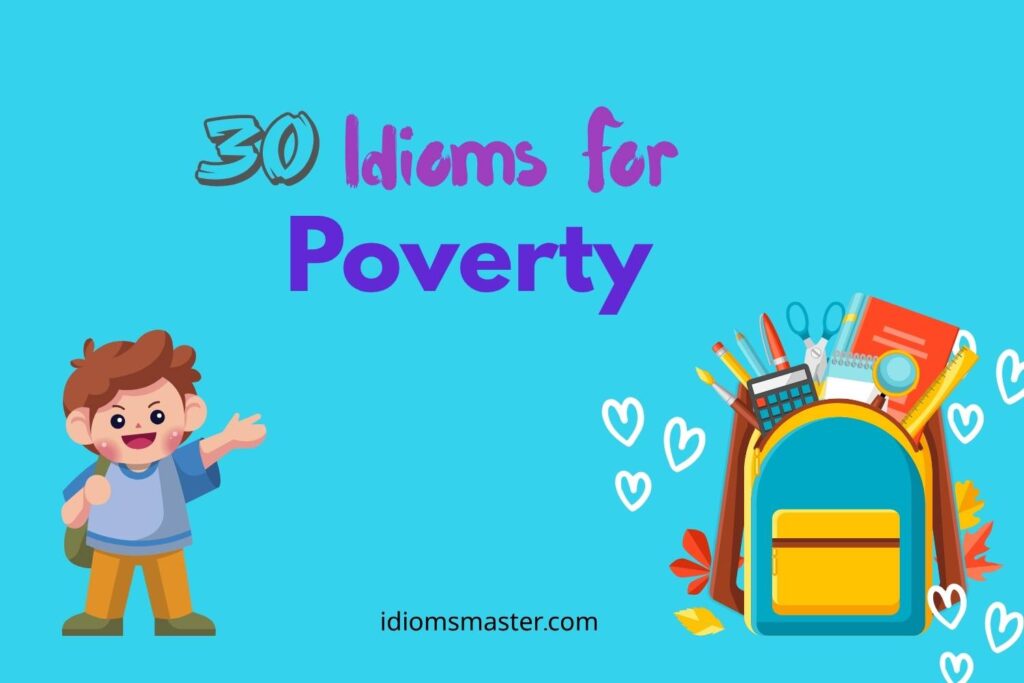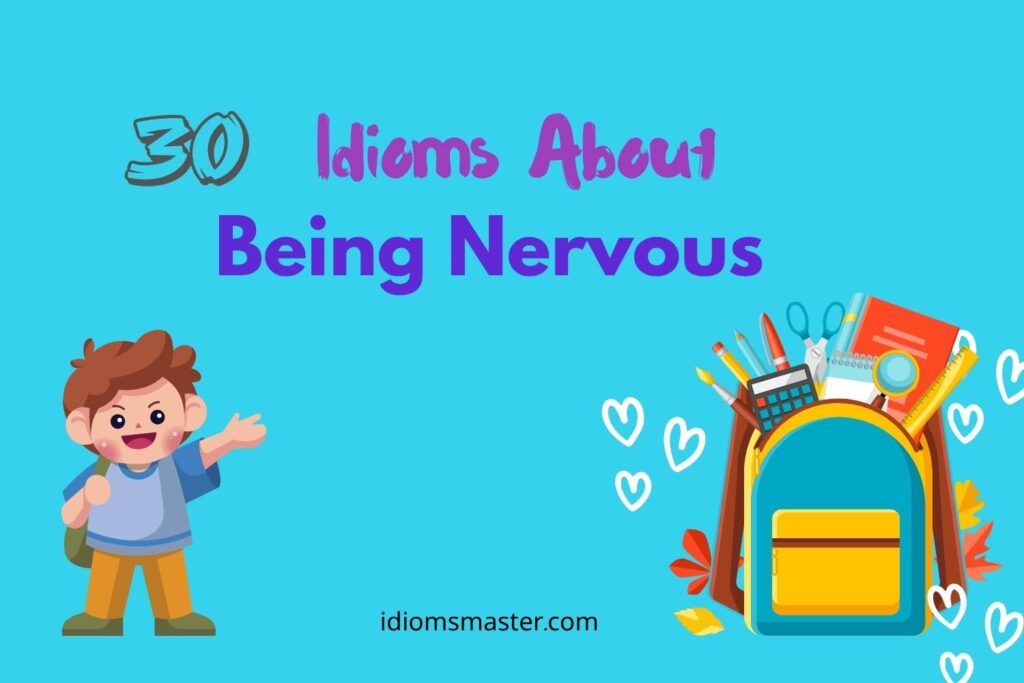Poverty means not having enough money to meet your basic needs. People who live in poverty may struggle to pay for food, clothes, or a place to live. Instead of saying “poor” or “living in poverty,” many people use idioms. These special phrases help show what life feels like in a more colorful way.
Writers and poets often use these idioms to describe hard times. They make the writing feel more real and emotional. Whether someone is sharing their own story or writing about someone else’s life, idioms can help others understand what it’s like. In this article, you’ll learn idioms that people use to talk about poverty.
Idioms for Poverty
1. Down and out
Meaning: Having no money, job, or home.
Samples: He ended up down and out after losing everything. / She helped a down-and-out family in her neighborhood.
To Put it Another Way: He had nothing left. / They were without work or shelter.
2. Dirt poor
Meaning: Extremely poor.
Samples: They grew up dirt poor in a small town. / She was dirt poor but never gave up.
To Put it Another Way: They had almost nothing. / Very poor and struggling.
3. On the breadline
Meaning: So poor that you rely on free food or support.
Samples: The family was on the breadline after the factory closed. / He stood in the breadline every morning.
To Put it Another Way: They needed help to eat. / He couldn’t afford food.
4. Without a dime
Meaning: Completely broke.
Samples: She left town without a dime. / He was without a dime after paying rent.
To Put it Another Way: No money at all. / Totally broke.
5. Living hand to mouth
Meaning: Having just enough to get by.
Samples: They lived hand to mouth with no savings. / She worked every day but still lived hand to mouth.
To Put it Another Way: Only enough to survive. / No money left over.
6. Not a penny to your name
Meaning: Having no money.
Samples: After the move, they didn’t have a penny to their name. / He came to the city not having a penny to his name.
To Put it Another Way: They were broke. / He had nothing saved.
7. Scraping by
Meaning: Just surviving with very little money.
Samples: They’re scraping by on one small paycheck. / She’s scraping by until she finds a better job.
To Put it Another Way: Barely making it. / Living on the edge.
8. Broke as a joke
Meaning: Very poor (said in a light, funny way).
Samples: I’m broke as a joke until payday. / He laughed, “I’m broke as a joke!”
To Put it Another Way: No money and a little humor. / Totally broke.
9. Flat broke
Meaning: Completely out of money.
Samples: I was flat broke after my trip. / She’s flat broke but still smiling.
To Put it Another Way: Not a dollar left. / Very poor.
10. Pockets turned inside out
Meaning: Showing that you have no money.
Samples: He reached in but his pockets were turned inside out. / I showed my empty pockets turned inside out.
To Put it Another Way: Nothing in my pockets. / Totally out of cash.
11. On a shoestring budget
Meaning: Living or working with very little money.
Samples: We planned our trip on a shoestring budget. / She decorated the room on a shoestring budget.
To Put it Another Way: We didn’t have much to spend. / Very low budget.
12. Paycheck to paycheck
Meaning: Spending all money before the next paycheck.
Samples: He lives paycheck to paycheck. / Many families survive paycheck to paycheck.
To Put it Another Way: Just getting by. / No money saved.
13. In the red
Meaning: Owing money or having less than zero.
Samples: My bank account is in the red. / They’re still in the red from last year.
To Put it Another Way: They owe money. / Account is negative.
14. Living on scraps
Meaning: Surviving on very little food or support.
Samples: He was living on scraps after the flood. / They were living on scraps for weeks.
To Put it Another Way: Barely eating. / Very little to live on.
15. Can’t make ends meet
Meaning: Can’t earn enough to pay bills.
Samples: They can’t make ends meet with two jobs. / We couldn’t make ends meet last year.
To Put it Another Way: Not enough money to cover costs. / Bills are too much.
16. From rags to rags
Meaning: Starting and staying poor.
Samples: It was a rags to rags story. / She lived a rags to rags life.
To Put it Another Way: Always poor. / Never escaped poverty.
17. Hard up
Meaning: Short on money.
Samples: We’re hard up this month. / He’s always hard up for cash.
To Put it Another Way: Don’t have enough. / Low on money.
18. A thin wallet
Meaning: Not much money.
Samples: His thin wallet kept him from shopping. / My wallet’s thin this weekend.
To Put it Another Way: I don’t have much to spend. / Not enough money.
19. Down to your last cent
Meaning: Almost completely broke.
Samples: I’m down to my last cent. / They were down to their last cent before help came.
To Put it Another Way: Just one coin left. / Out of money.
20. Tighten your belt
Meaning: Spend less to save money.
Samples: We had to tighten our belts this month. / It’s time to tighten our belts and save.
To Put it Another Way: Be careful with spending. / Cut back on extras.
21. Living in poverty
Meaning: Living with too little to meet needs.
Samples: Many families are living in poverty. / He writes poems about growing up in poverty.
To Put it Another Way: Very little money. / Struggling to survive.
22. Poor as a church mouse
Meaning: Extremely poor.
Samples: I was poor as a church mouse in college. / They’re poor as church mice, but kind.
To Put it Another Way: Very poor. / No money at all.
23. Running on empty
Meaning: No money or energy left.
Samples: We’re running on empty this week. / She’s running on empty after bills.
To Put it Another Way: Nothing left. / Very tired and broke.
24. Hand to mouth
Meaning: Surviving day to day.
Samples: They live hand to mouth every day. / It’s a hand-to-mouth life for them.
To Put it Another Way: Just enough for today. / No savings.
25. Cash-strapped
Meaning: Having little money to use.
Samples: We’re cash-strapped this month. / He’s too cash-strapped to go out.
To Put it Another Way: Not enough money. / Very short on cash.
26. Living on borrowed time
Meaning: Living with no backup or support.
Samples: After job loss, they were living on borrowed time. / I felt like we were living on borrowed time.
To Put it Another Way: We were at risk. / Time and money were running out.
27. On welfare
Meaning: Getting help from the government due to poverty.
Samples: She’s been on welfare since the accident. / The family gets food from welfare programs.
To Put it Another Way: Receiving help. / Support from the government.
28. Go bust
Meaning: To lose everything financially.
Samples: Their store went bust last year. / He went bust after too many bills.
To Put it Another Way: Lost all money. / Business or life failed.
29. Ramen diet
Meaning: Eating cheap food due to poverty.
Samples: I’m on the ramen diet this week. / His “ramen diet” poem was funny and sad.
To Put it Another Way: Eating cheaply. / Living with very little.
30. On the edge
Meaning: Living close to losing everything.
Samples: They were living on the edge after the rent hike. / She felt on the edge every day.
To Put it Another Way: Nearly broke. / Just one step from losing it all.
Find the Topics: Idioms for Poverty
Activity: “The Lemonade Stand Plan”
Jayden wanted to go on the class trip, but his family was cash-strapped. His mom said, “We’re living hand to mouth right now, but we’ll figure something out.”
Jayden didn’t want to ask for money, so he came up with a plan. “What if I start a lemonade stand?” he asked his best friend. “I’m flat broke, but I’ve got lemons at home.”
They set up the stand the next morning. “I’m running on a shoestring budget, but this might work,” Jayden said. After the first few sales, he smiled, “I’m not down and out just yet!”
By lunchtime, they had sold enough to pay for half the trip. “We’re still scraping by,” said Jayden, “but this helps a lot.”
When his teacher asked how he did it, Jayden answered, “Even with not a penny to my name, I found a way. Just had to tighten my belt and think hard.”
Your Task:
Underline or list the 8 idioms for poverty used in the story.
Answer Key
- Cash-strapped
- Living hand to mouth
- Flat broke
- Shoestring budget
- Down and out
- Scraping by
- Not a penny to my name
- Tighten my belt
Conclusion
Idioms for poverty help people talk about hard times using real and emotional words. They show how it feels to live with less, and how people try to keep going even when things are tough.
Writers, poets, and speakers use these phrases to make their stories more powerful. When you learn idioms like these, you can better describe what someone is going through and understand them too.




